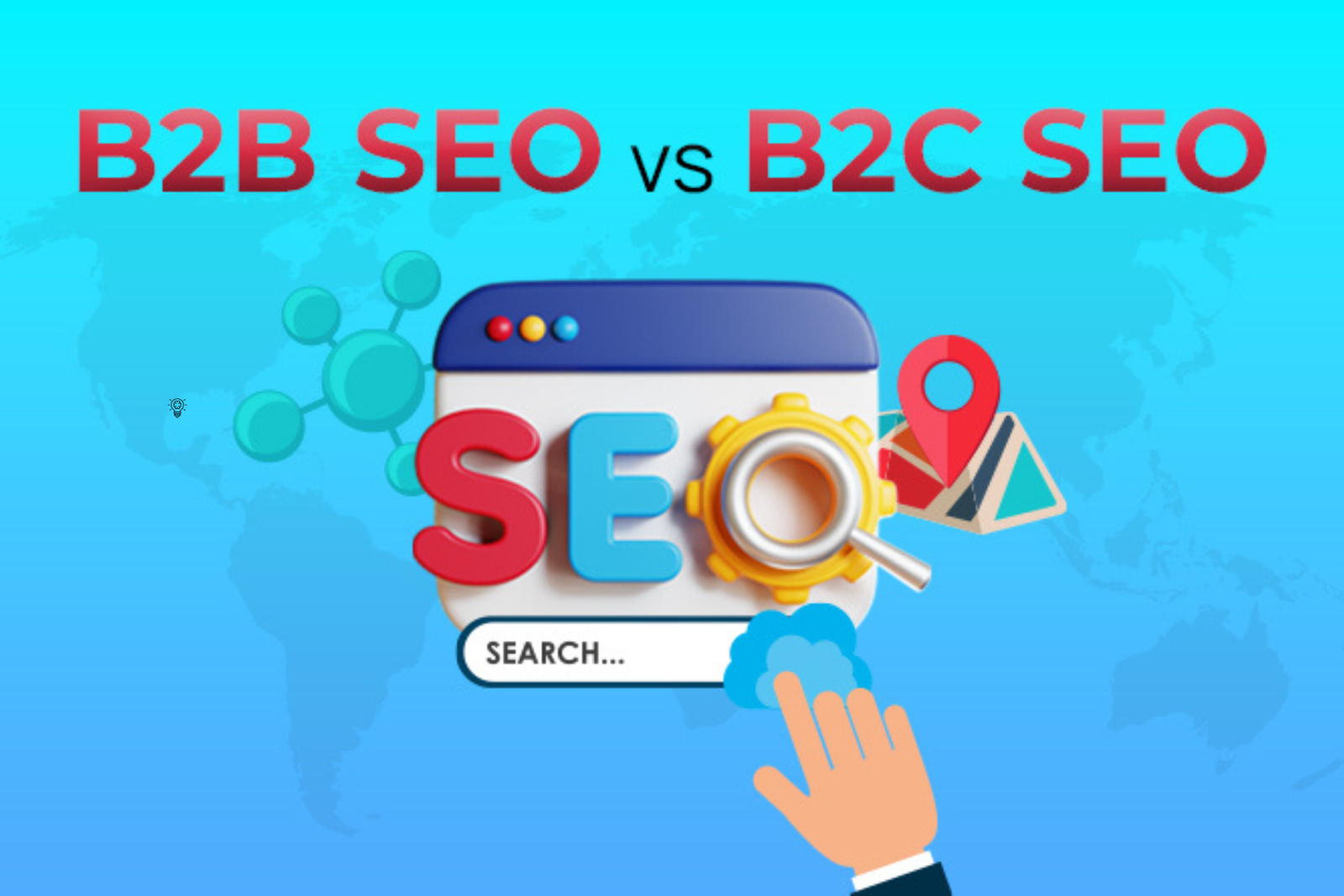Navigating and untangling the complexities of Search Engine Optimization (SEO) can be daunting, especially when dealing with two distinct business landscapes: Business-to-Business (B2B) and Business-to-Consumer (B2C). Understanding the key differences between B2B and B2C SEO strategies is essential for optimizing your online presence. In this blog, ‘Understanding the Difference Between B2B SEO and B2C SEO,’ we’ll discuss B2B SEO services and B2C SEO services, highlighting their unique challenges and best practices.
One of the key differences between B2B and B2C SEO is the core goals and objectives of the campaigns. The B2B buying process is more complex due to larger and more costly purchases and a longer sales cycle.
B2B SEO campaigns focus on brand exposure and generating potential leads that can turn into sales through demo requests, whitepaper downloads, sign-ups, newsletters, etc. In contrast, B2C SEO campaigns aim to attract more visitors and encourage them to make purchases on the website. These differences also influence how SEO strategies are applied. However, SEO strategies can be tailored to suit both B2B and B2C campaigns effectively.
What’s the Difference Between B2B and B2C?
Before we dive into the complex aspects, let’s start with the basics.
B2C (Business-to-Consumer):
B2C refers to the method of selling services directly to consumers. In an online context, the process typically involves consumers finding your website or brand, browsing products, and completing the checkout process after paying for their desired product.
B2B (Business-to-Business):
B2B involves selling products or services to other businesses. B2B transactions are generally more complex compared to B2C. For example, in B2C, a customer might see a post about a bag sale, visit the website, and make a purchase quickly. However, B2B sales involve a longer and more intricate process. Since the products and services are often more specialized and high-value, it can take much longer to convert a prospect into a lead and then into a paying customer. This process can span several months, as potential clients need time to discover your brand, visit your website, explore your services, and make a final decision. This complexity necessitates more advanced SEO strategies for B2B.
Differences in Transactions, Sales, and Messaging:
Transactions, sales processes, and messaging differ significantly between B2B and B2C. For B2B, it is crucial to implement the right tactics to target businesses effectively, while B2C strategies focus on attracting and converting individual consumers. This distinction makes it essential for marketers to tailor their approaches based on whether they are targeting businesses or consumers.
Key Challenges of B2B SEO
Let’s admit it, SEO is quite challenging nowadays. Here we’ll discuss the specific challenges that B2B marketers face with SEO and how it differs from B2C.
Language and Keyword Use:
The vocabulary of B2B marketing is more complex than B2C. This is because B2B buyers are looking to solve specific organizational issues and integrate solutions with existing systems.
For example, there’s no need to explain the exact technology behind Ziploc bags—customers understand they keep food fresh. However, a CRM technology provider must disclose and explain every feature since potential buyers need to understand the software. The B2B language is much more technical than B2C, which is why reaching out to the audience with accurate and precise information while sounding like an expert is crucial.
Decision Makers:
B2C purchases are typically decided by a single individual, while B2B purchases are influenced by multiple decision-makers. Each decision-maker has the ability and resources to research their options, whether it’s a competitive product or service. Therefore, B2B SEOs must focus on multiple searchers and ensure that the search terms are addressed on specific landing pages that meet the needs of each decision-maker.
Goals:
Both B2B and B2C search campaigns aim to increase sales and revenue. However, the goal of B2B SEO is not to make an immediate sale but to drive conversions that will lead to a sale. For instance, B2B search marketers might aim for potential customers to request a demo or sign up for a free trial, whereas a B2C SEO strategy focuses more directly on making a sale in a single session.
On-Page Content:
In B2B, natural language is crucial. The content on a website should be optimized for both search engines and B2B buyers. B2B search marketers must focus on on-page copy that is aligned with the potential buyer’s challenges. In contrast, B2C SEO prioritizes product specifications, availability, and pricing.
User Intent:
User intent should be the top priority for B2B marketers, especially concerning the conversion funnel in relation to search. Providing content that meets the actual needs of the customer is essential.
This is important because the B2B sales funnel is much longer, involving various stages of the buying process before a sale is made. Therefore, B2B SEO must focus on different areas compared to B2C marketers.
By understanding these differences, B2B marketers can tailor their SEO strategies to address the unique challenges and opportunities in their market, ensuring their efforts are both effective and efficient.


We are actively engaging with B2B deals, if you are interested let me know
You explained well, thank you